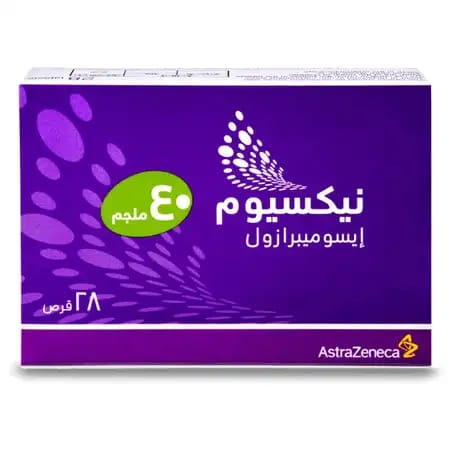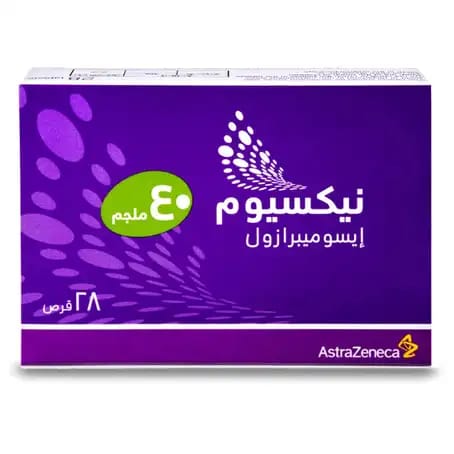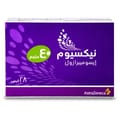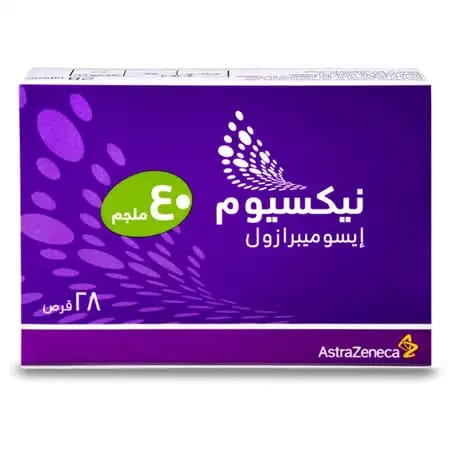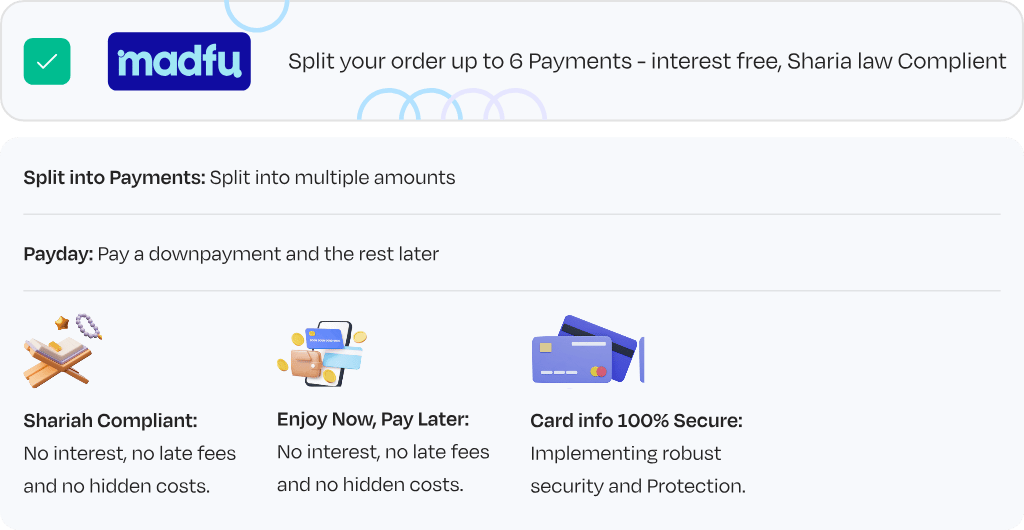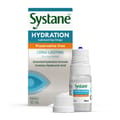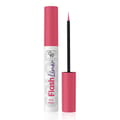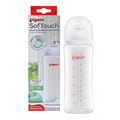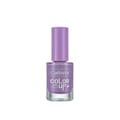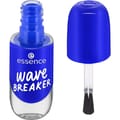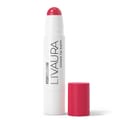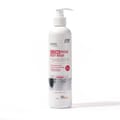What Esomeprazole is and what it is used for:
•Esomeprazole belongs to a group of medicines called ‘proton pump inhibitors’. They work by reducing the amount of acid that your stomach produces.
• This medicine is used in adults for the short term treatment of reflux symptoms (for example, heartburn and acid regurgitation).
•Reflux is the backflow of acid from the stomach into the gullet (“foodpipe”) which may become inflamed and painful. This may cause you symptoms such as a painful sensation in the chest rising up to your throat (heartburn) and a sour taste in the mouth (acid regurgitation).
•Esomeprazole is not meant to bring immediate relief.
•You may need to take the capsules for 2-3 days in a row before you feel better. You must talk to a doctor if you do not feel better or if you feel worse after 14 days.
What you need to know before you use Esomeprazole:
Do not use Esomeprazole:
• If you are allergic to Esomeprazole or any of the other ingredients in this medicine
• If you are allergic to medicines containing other proton pump inhibitors (e.g. pantoprazole, lansoprazole, rabeprazole or omeprazole).
• If you are taking a medicine containing nelfinavir (used to treat HIV infection).
Warnings and precautions:
You should let your doctor know:
• You have had a stomach ulcer or stomach surgery in the past.
• You have been taking treatment continuously for reflux or heartburn for 4 or more weeks.
• You have jaundice (yellowing of skin or eyes) or severe liver problems.
• You have severe kidney problems.
• You are aged over 55 years and have new or recently changed reflux symptoms or need to take a non-prescription indigestion or heartburn remedy treatment every day.
• You have ever had a skin reaction after treatment with a medicine similar to Esomeprazole that reduces stomach acid.
• You are due to have an endoscopy or a urea breath test.
• You are due to have a specific blood test (Chromogranin A).
Other medicines and Esomeprazole:
•Do not take this medicine if you are also taking a medicine containing nelfinavir (used to treat HIV infection).
•You should specifically tell your doctor or pharmacist if you are taking clopidogrel (used to prevent blood clots).
•Do not take this medicine with other medicines that limit the amount of acid produced in your stomach such as proton pump inhibitors (e.g. pantoprazole, lansoprazole, rabeprazole or omeprazole) or an H2 antagonist (e.g. ranitidine or famotidine)
Inform your doctor about the medicines you are taking, especially mention to you doctor if you are taking:
• Ketoconazole and itraconazole (used to treat infections caused by a fungus).
• Voriconazole (used to treat infections caused by a fungus) and clarithromycin (used to treat infections). Your doctor may adjust your dose of Esomeprazole if you also have severe liver problems and are treated for a long period of time.
• Erlotinib (used to treat cancer).
• Methotrexate (used to treat cancer and rheumatic disorders).
• Digoxin (used for heart problems).
• Atazanavir, saquinavir (used to treat HIV infection).
• Citalopram, imipramine or clomipramine (used to treat depression).
• Diazepam (used to treat anxiety, relax muscles or in epilepsy).
• Phenytoin (used to treat epilepsy).
• Medicines that are used to thin your blood, such as warfarin. Your doctor may need to monitor you when you start or stop taking Esomeprazole.
• Cilostazol (used to treat intermittent claudication – a condition where poor blood supply to the leg muscles causes pain and difficulty in walking).
• Cisapride (used for indigestion and heartburn).
• Rifampicin (used to treat tuberculosis).
• Tacrolimus (in cases of organ transplantation).
• St. John’s wort (Hypericum perforatum) (used to treat depression). risk of a lowered threshold for seizures.
Children and adolescents:
Esomeprazole should normally not be used for children and adolescents under 18 years.
- Home
- Medications
- Medication
- Nexium 40 mg Gastro-resistant 28 Tablets
Nexium 40 mg Gastro-resistant 28 Tablets
 77.25
77.25Loyalty Program
Loyalty
For each qualifying purchase you make, you will accumulate loyalty points. These points can then be redeemed for a variety of rewards such as discounts, exclusive, offers or even free products.
For Each
100
SAR
-->
100
POINTS
TIER2
100
SPAR SPEND
=
100
POINTS
TIER3
100
SPAR SPEND
=
100
POINTS
- Details
What Esomeprazole is and what it is used for:
•Esomeprazole belongs to a group of medicines called ‘proton pump inhibitors’. They work by reducing the amount of acid that your stomach produces.
• This medicine is used in adults for the short term treatment of reflux symptoms (for example, heartburn and acid regurgitation).
•Reflux is the backflow of acid from the stomach into the gullet (“foodpipe”) which may become inflamed and painful. This may cause you symptoms such as a painful sensation in the chest rising up to your throat (heartburn) and a sour taste in the mouth (acid regurgitation).
•Esomeprazole is not meant to bring immediate relief.
•You may need to take the capsules for 2-3 days in a row before you feel better. You must talk to a doctor if you do not feel better or if you feel worse after 14 days.
What you need to know before you use Esomeprazole:
Do not use Esomeprazole:
• If you are allergic to Esomeprazole or any of the other ingredients in this medicine
• If you are allergic to medicines containing other proton pump inhibitors (e.g. pantoprazole, lansoprazole, rabeprazole or omeprazole).
• If you are taking a medicine containing nelfinavir (used to treat HIV infection).
Warnings and precautions:
You should let your doctor know:
• You have had a stomach ulcer or stomach surgery in the past.
• You have been taking treatment continuously for reflux or heartburn for 4 or more weeks.
• You have jaundice (yellowing of skin or eyes) or severe liver problems.
• You have severe kidney problems.
• You are aged over 55 years and have new or recently changed reflux symptoms or need to take a non-prescription indigestion or heartburn remedy treatment every day.
• You have ever had a skin reaction after treatment with a medicine similar to Esomeprazole that reduces stomach acid.
• You are due to have an endoscopy or a urea breath test.
• You are due to have a specific blood test (Chromogranin A).
Other medicines and Esomeprazole:
•Do not take this medicine if you are also taking a medicine containing nelfinavir (used to treat HIV infection).
•You should specifically tell your doctor or pharmacist if you are taking clopidogrel (used to prevent blood clots).
•Do not take this medicine with other medicines that limit the amount of acid produced in your stomach such as proton pump inhibitors (e.g. pantoprazole, lansoprazole, rabeprazole or omeprazole) or an H2 antagonist (e.g. ranitidine or famotidine)
Inform your doctor about the medicines you are taking, especially mention to you doctor if you are taking:
• Ketoconazole and itraconazole (used to treat infections caused by a fungus).
• Voriconazole (used to treat infections caused by a fungus) and clarithromycin (used to treat infections). Your doctor may adjust your dose of Esomeprazole if you also have severe liver problems and are treated for a long period of time.
• Erlotinib (used to treat cancer).
• Methotrexate (used to treat cancer and rheumatic disorders).
• Digoxin (used for heart problems).
• Atazanavir, saquinavir (used to treat HIV infection).
• Citalopram, imipramine or clomipramine (used to treat depression).
• Diazepam (used to treat anxiety, relax muscles or in epilepsy).
• Phenytoin (used to treat epilepsy).
• Medicines that are used to thin your blood, such as warfarin. Your doctor may need to monitor you when you start or stop taking Esomeprazole.
• Cilostazol (used to treat intermittent claudication – a condition where poor blood supply to the leg muscles causes pain and difficulty in walking).
• Cisapride (used for indigestion and heartburn).
• Rifampicin (used to treat tuberculosis).
• Tacrolimus (in cases of organ transplantation).
• St. John’s wort (Hypericum perforatum) (used to treat depression). risk of a lowered threshold for seizures.
Children and adolescents:
Esomeprazole should normally not be used for children and adolescents under 18 years.
What Esomeprazole is and what it is used for:
•Esomeprazole belongs to a group of medicines called ‘proton pump inhibitors’. They work by reducing the amount of acid that your stomach produces.
• This medicine is used in adults for the short term treatment of reflux symptoms (for example, heartburn and acid regurgitation).
•Reflux is the backflow of acid from the stomach into the gullet (“foodpipe”) which may become inflamed and painful. This may cause you symptoms such as a painful sensation in the chest rising up to your throat (heartburn) and a sour taste in the mouth (acid regurgitation).
•Esomeprazole is not meant to bring immediate relief.
•You may need to take the capsules for 2-3 days in a row before you feel better. You must talk to a doctor if you do not feel better or if you feel worse after 14 days.
What you need to know before you use Esomeprazole:
Do not use Esomeprazole:
• If you are allergic to Esomeprazole or any of the other ingredients in this medicine
• If you are allergic to medicines containing other proton pump inhibitors (e.g. pantoprazole, lansoprazole, rabeprazole or omeprazole).
• If you are taking a medicine containing nelfinavir (used to treat HIV infection).
Warnings and precautions:
You should let your doctor know:
• You have had a stomach ulcer or stomach surgery in the past.
• You have been taking treatment continuously for reflux or heartburn for 4 or more weeks.
• You have jaundice (yellowing of skin or eyes) or severe liver problems.
• You have severe kidney problems.
• You are aged over 55 years and have new or recently changed reflux symptoms or need to take a non-prescription indigestion or heartburn remedy treatment every day.
• You have ever had a skin reaction after treatment with a medicine similar to Esomeprazole that reduces stomach acid.
• You are due to have an endoscopy or a urea breath test.
• You are due to have a specific blood test (Chromogranin A).
Other medicines and Esomeprazole:
•Do not take this medicine if you are also taking a medicine containing nelfinavir (used to treat HIV infection).
•You should specifically tell your doctor or pharmacist if you are taking clopidogrel (used to prevent blood clots).
•Do not take this medicine with other medicines that limit the amount of acid produced in your stomach such as proton pump inhibitors (e.g. pantoprazole, lansoprazole, rabeprazole or omeprazole) or an H2 antagonist (e.g. ranitidine or famotidine)
Inform your doctor about the medicines you are taking, especially mention to you doctor if you are taking:
• Ketoconazole and itraconazole (used to treat infections caused by a fungus).
• Voriconazole (used to treat infections caused by a fungus) and clarithromycin (used to treat infections). Your doctor may adjust your dose of Esomeprazole if you also have severe liver problems and are treated for a long period of time.
• Erlotinib (used to treat cancer).
• Methotrexate (used to treat cancer and rheumatic disorders).
• Digoxin (used for heart problems).
• Atazanavir, saquinavir (used to treat HIV infection).
• Citalopram, imipramine or clomipramine (used to treat depression).
• Diazepam (used to treat anxiety, relax muscles or in epilepsy).
• Phenytoin (used to treat epilepsy).
• Medicines that are used to thin your blood, such as warfarin. Your doctor may need to monitor you when you start or stop taking Esomeprazole.
• Cilostazol (used to treat intermittent claudication – a condition where poor blood supply to the leg muscles causes pain and difficulty in walking).
• Cisapride (used for indigestion and heartburn).
• Rifampicin (used to treat tuberculosis).
• Tacrolimus (in cases of organ transplantation).
• St. John’s wort (Hypericum perforatum) (used to treat depression). risk of a lowered threshold for seizures.
Children and adolescents:
Esomeprazole should normally not be used for children and adolescents under 18 years.
Always take this medicine exactly as described in this leaflet or as your doctor or pharmacist have told you. Check with your doctor or pharmacist if you are not sure.
How much to take:
• The recommended dose is one capsule a day.
• Do not take more than this recommended dose of one capsule (20 mg) a day, even if you don’t feel an improvement immediately.
• You may need to take the capsules for 2 or 3 days in a row before your reflux symptoms (for example, heartburn and acid regurgitation) get better.
• The treatment length is up to 14 days.
• When your reflux symptoms have completely gone you should stop taking this medicine.
• If your reflux symptoms get worse or do not improve after taking this medicine for 14 days in a row, you should consult a doctor. If you have persistent or longstanding, frequently recurring symptoms even after treatment with this medicine, you should contact your doctor. Taking this medicine
• You can take your capsule at any time of the day either with food or on an empty stomach.
• Swallow your capsule whole with half a glass of water. Do not chew, crush or open the capsule. This is because the capsule contains coated pellets, which stop the medicine from being broken down by the acid in your stomach.
• It is important not to damage the pellets.
What Esomeprazole is and what it is used for:
•Esomeprazole belongs to a group of medicines called ‘proton pump inhibitors’. They work by reducing the amount of acid that your stomach produces.
• This medicine is used in adults for the short term treatment of reflux symptoms (for example, heartburn and acid regurgitation).
•Reflux is the backflow of acid from the stomach into the gullet (“foodpipe”) which may become inflamed and painful. This may cause you symptoms such as a painful sensation in the chest rising up to your throat (heartburn) and a sour taste in the mouth (acid regurgitation).
•Esomeprazole is not meant to bring immediate relief.
•You may need to take the capsules for 2-3 days in a row before you feel better. You must talk to a doctor if you do not feel better or if you feel worse after 14 days.
What you need to know before you use Esomeprazole:
Do not use Esomeprazole:
• If you are allergic to Esomeprazole or any of the other ingredients in this medicine
• If you are allergic to medicines containing other proton pump inhibitors (e.g. pantoprazole, lansoprazole, rabeprazole or omeprazole).
• If you are taking a medicine containing nelfinavir (used to treat HIV infection).
Warnings and precautions:
You should let your doctor know:
• You have had a stomach ulcer or stomach surgery in the past.
• You have been taking treatment continuously for reflux or heartburn for 4 or more weeks.
• You have jaundice (yellowing of skin or eyes) or severe liver problems.
• You have severe kidney problems.
• You are aged over 55 years and have new or recently changed reflux symptoms or need to take a non-prescription indigestion or heartburn remedy treatment every day.
• You have ever had a skin reaction after treatment with a medicine similar to Esomeprazole that reduces stomach acid.
• You are due to have an endoscopy or a urea breath test.
• You are due to have a specific blood test (Chromogranin A).
Other medicines and Esomeprazole:
•Do not take this medicine if you are also taking a medicine containing nelfinavir (used to treat HIV infection).
•You should specifically tell your doctor or pharmacist if you are taking clopidogrel (used to prevent blood clots).
•Do not take this medicine with other medicines that limit the amount of acid produced in your stomach such as proton pump inhibitors (e.g. pantoprazole, lansoprazole, rabeprazole or omeprazole) or an H2 antagonist (e.g. ranitidine or famotidine)
Inform your doctor about the medicines you are taking, especially mention to you doctor if you are taking:
• Ketoconazole and itraconazole (used to treat infections caused by a fungus).
• Voriconazole (used to treat infections caused by a fungus) and clarithromycin (used to treat infections). Your doctor may adjust your dose of Esomeprazole if you also have severe liver problems and are treated for a long period of time.
• Erlotinib (used to treat cancer).
• Methotrexate (used to treat cancer and rheumatic disorders).
• Digoxin (used for heart problems).
• Atazanavir, saquinavir (used to treat HIV infection).
• Citalopram, imipramine or clomipramine (used to treat depression).
• Diazepam (used to treat anxiety, relax muscles or in epilepsy).
• Phenytoin (used to treat epilepsy).
• Medicines that are used to thin your blood, such as warfarin. Your doctor may need to monitor you when you start or stop taking Esomeprazole.
• Cilostazol (used to treat intermittent claudication – a condition where poor blood supply to the leg muscles causes pain and difficulty in walking).
• Cisapride (used for indigestion and heartburn).
• Rifampicin (used to treat tuberculosis).
• Tacrolimus (in cases of organ transplantation).
• St. John’s wort (Hypericum perforatum) (used to treat depression). risk of a lowered threshold for seizures.
Children and adolescents:
Esomeprazole should normally not be used for children and adolescents under 18 years.
Always take this medicine exactly as described in this leaflet or as your doctor or pharmacist have told you. Check with your doctor or pharmacist if you are not sure.
How much to take:
• The recommended dose is one capsule a day.
• Do not take more than this recommended dose of one capsule (20 mg) a day, even if you don’t feel an improvement immediately.
• You may need to take the capsules for 2 or 3 days in a row before your reflux symptoms (for example, heartburn and acid regurgitation) get better.
• The treatment length is up to 14 days.
• When your reflux symptoms have completely gone you should stop taking this medicine.
• If your reflux symptoms get worse or do not improve after taking this medicine for 14 days in a row, you should consult a doctor. If you have persistent or longstanding, frequently recurring symptoms even after treatment with this medicine, you should contact your doctor. Taking this medicine
• You can take your capsule at any time of the day either with food or on an empty stomach.
• Swallow your capsule whole with half a glass of water. Do not chew, crush or open the capsule. This is because the capsule contains coated pellets, which stop the medicine from being broken down by the acid in your stomach.
• It is important not to damage the pellets.
What Esomeprazole is and what it is used for:
•Esomeprazole belongs to a group of medicines called ‘proton pump inhibitors’. They work by reducing the amount of acid that your stomach produces.
• This medicine is used in adults for the short term treatment of reflux symptoms (for example, heartburn and acid regurgitation).
•Reflux is the backflow of acid from the stomach into the gullet (“foodpipe”) which may become inflamed and painful. This may cause you symptoms such as a painful sensation in the chest rising up to your throat (heartburn) and a sour taste in the mouth (acid regurgitation).
•Esomeprazole is not meant to bring immediate relief.
•You may need to take the capsules for 2-3 days in a row before you feel better. You must talk to a doctor if you do not feel better or if you feel worse after 14 days.
What you need to know before you use Esomeprazole:
Do not use Esomeprazole:
• If you are allergic to Esomeprazole or any of the other ingredients in this medicine
• If you are allergic to medicines containing other proton pump inhibitors (e.g. pantoprazole, lansoprazole, rabeprazole or omeprazole).
• If you are taking a medicine containing nelfinavir (used to treat HIV infection).
Warnings and precautions:
You should let your doctor know:
• You have had a stomach ulcer or stomach surgery in the past.
• You have been taking treatment continuously for reflux or heartburn for 4 or more weeks.
• You have jaundice (yellowing of skin or eyes) or severe liver problems.
• You have severe kidney problems.
• You are aged over 55 years and have new or recently changed reflux symptoms or need to take a non-prescription indigestion or heartburn remedy treatment every day.
• You have ever had a skin reaction after treatment with a medicine similar to Esomeprazole that reduces stomach acid.
• You are due to have an endoscopy or a urea breath test.
• You are due to have a specific blood test (Chromogranin A).
Other medicines and Esomeprazole:
•Do not take this medicine if you are also taking a medicine containing nelfinavir (used to treat HIV infection).
•You should specifically tell your doctor or pharmacist if you are taking clopidogrel (used to prevent blood clots).
•Do not take this medicine with other medicines that limit the amount of acid produced in your stomach such as proton pump inhibitors (e.g. pantoprazole, lansoprazole, rabeprazole or omeprazole) or an H2 antagonist (e.g. ranitidine or famotidine)
Inform your doctor about the medicines you are taking, especially mention to you doctor if you are taking:
• Ketoconazole and itraconazole (used to treat infections caused by a fungus).
• Voriconazole (used to treat infections caused by a fungus) and clarithromycin (used to treat infections). Your doctor may adjust your dose of Esomeprazole if you also have severe liver problems and are treated for a long period of time.
• Erlotinib (used to treat cancer).
• Methotrexate (used to treat cancer and rheumatic disorders).
• Digoxin (used for heart problems).
• Atazanavir, saquinavir (used to treat HIV infection).
• Citalopram, imipramine or clomipramine (used to treat depression).
• Diazepam (used to treat anxiety, relax muscles or in epilepsy).
• Phenytoin (used to treat epilepsy).
• Medicines that are used to thin your blood, such as warfarin. Your doctor may need to monitor you when you start or stop taking Esomeprazole.
• Cilostazol (used to treat intermittent claudication – a condition where poor blood supply to the leg muscles causes pain and difficulty in walking).
• Cisapride (used for indigestion and heartburn).
• Rifampicin (used to treat tuberculosis).
• Tacrolimus (in cases of organ transplantation).
• St. John’s wort (Hypericum perforatum) (used to treat depression). risk of a lowered threshold for seizures.
Children and adolescents:
Esomeprazole should normally not be used for children and adolescents under 18 years.
Always take this medicine exactly as described in this leaflet or as your doctor or pharmacist have told you. Check with your doctor or pharmacist if you are not sure.
How much to take:
• The recommended dose is one capsule a day.
• Do not take more than this recommended dose of one capsule (20 mg) a day, even if you don’t feel an improvement immediately.
• You may need to take the capsules for 2 or 3 days in a row before your reflux symptoms (for example, heartburn and acid regurgitation) get better.
• The treatment length is up to 14 days.
• When your reflux symptoms have completely gone you should stop taking this medicine.
• If your reflux symptoms get worse or do not improve after taking this medicine for 14 days in a row, you should consult a doctor. If you have persistent or longstanding, frequently recurring symptoms even after treatment with this medicine, you should contact your doctor. Taking this medicine
• You can take your capsule at any time of the day either with food or on an empty stomach.
• Swallow your capsule whole with half a glass of water. Do not chew, crush or open the capsule. This is because the capsule contains coated pellets, which stop the medicine from being broken down by the acid in your stomach.
• It is important not to damage the pellets.

